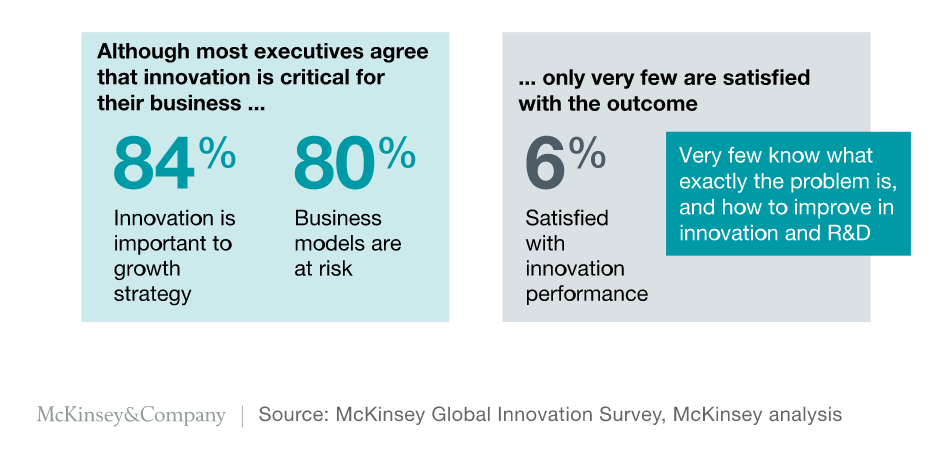
Why is achieving innovation success so challenging?
The business environment is rapidly changing, and this change is driven by technological progress. Digital innovation is the one sure way to truly get ahead of the competition or indeed to create and own new markets. Adopting blockchain, IoT, AR/VR, RPA and AI, forward-thinking businesses can upgrade their existing products or deliver new solutions to create their unique selling points and gain a competitive edge.
Staying ahead is a challenge, however: a McKinsey Global Innovation Survey found that 84% of executives consider innovation important for future growth, yet only 6% is satisfied with the performance of their innovation strategy.

Innovation is by nature a complex and risky endeavour, and if the innovation process does not eventually contribute to the bottom line, it has effectively failed the business. There is a multitude of challenges that can prevent the innovation process from contributing to the bottom line, including:
- Failure to establish goals. Whatever innovative initiative you are starting, it should always have a measure of goal-setting. Successful digital innovation is not enabled by limitless blue-sky thinking. Instead, teams should work to goal-driven timelines. Before taking any action, you need to have a plan in place, including milestones and outlining every small step along the way. You need to clearly define your goals and expectations, how the success looks like for you and how you are going to measure your results.
- Lack of market understanding. Before creating something new, make sure there’s a genuine demand for the product. Otherwise, you can be at risk of developing products that nobody wants. Digital innovation should centre around established market needs, and innovation strategies must be built on informed market research.
- Problems monetising innovation. Even where a new product or service meets market needs, profitability can be elusive. An innovative product could be too expensive to deliver in practice or be too difficult to scale for a wider market beyond first adopters. Competitors may also rapidly surface with cheaper substitutes.
Not knowing the essential insights and proceeding in an unplanned manner will weaken efforts at profitable innovation. But what is the answer to the lack of strategy and coordination around innovation?

Reduce technological uncertainty with technical feasibility study
For both enterprises and SMBs, innovation begins at the technology layer. In finding new applications, companies must explore the boundaries of hardware and software technology. Finding a starting point can be a challenge in itself but determining whether an innovative idea is technically feasible is an altogether different question.
A technical feasibility study starts with scoping out the latest, emerging technologies such as blockchain, AI and machine learning so that a business can map out the technical possibilities. Next, a feasibility study can determine whether proposed technical solutions are at all practical.
By initiating the relatively low costs of a technical feasibility study at the start of the innovation process, CTOs can reduce initial investment costs and minimise technical uncertainties. Technical feasibility studies also supply an overall clearer picture as input for the innovation process.
Test your concept in the safe environment through PoC development
Exploring technological options via a feasibility study allows a business to come up with innovative concepts that are technically feasible. Whether the market has any desire for these concepts to be realised is another matter altogether, so building proof of concept alongside a technical feasibility study is key.
Developing a proof of concept, a business tests whether a concept is marketable, what it will cost to execute, and whether the long-run revenue delivered by a concept will cover its costs.
Even the most complex ideas can be tested for market viability through a proof of concept process, and it is important to do so even where technical feasibility is already established. Based on feedback, businesses can predict the success of an innovation project before large sums are invested in its execution. Proof of concept work enables an understanding of the broader market and takes on the views of stakeholders to reduce the risk of embarking on projects that are set to fail.
A planned, informed approach to digital innovation
Yes, a lack of ideas will trip up the innovation process. Nonetheless, even with the brightest of ideas, businesses can find that profitable innovation remains elusive. Unlocking success relies on gaining deeper insight into the technologies that power innovation, and the broader market considerations that govern innovation success.
For a business that is closely involved in its native market, it can be difficult to develop an enlightened, independent view of feasibility and market acceptance. Partnering with an experienced software development vendor can help you develop solutions that are both, innovative and future-proof.
Let’s discuss how ELEKS can help you optimise your innovation strategy. Get in touch with us.

Related Insights








The breadth of knowledge and understanding that ELEKS has within its walls allows us to leverage that expertise to make superior deliverables for our customers. When you work with ELEKS, you are working with the top 1% of the aptitude and engineering excellence of the whole country.

Right from the start, we really liked ELEKS’ commitment and engagement. They came to us with their best people to try to understand our context, our business idea, and developed the first prototype with us. They were very professional and very customer oriented. I think, without ELEKS it probably would not have been possible to have such a successful product in such a short period of time.

ELEKS has been involved in the development of a number of our consumer-facing websites and mobile applications that allow our customers to easily track their shipments, get the information they need as well as stay in touch with us. We’ve appreciated the level of ELEKS’ expertise, responsiveness and attention to details.

